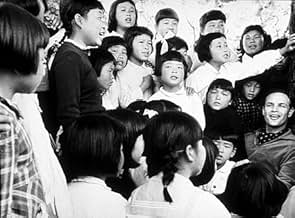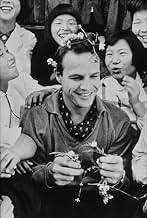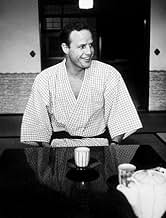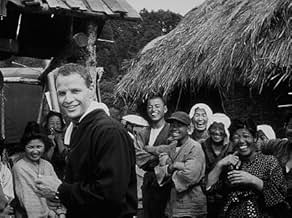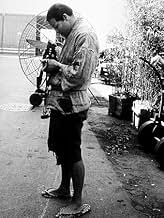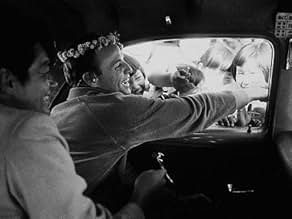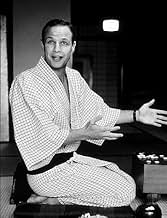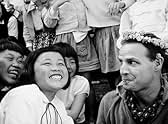IMDb रेटिंग
6.6/10
3.9 हज़ार
आपकी रेटिंग
अपनी भाषा में प्लॉट जोड़ेंIn post-WWII Japan, an American captain is brought in to help build a school, but the locals want a teahouse instead.In post-WWII Japan, an American captain is brought in to help build a school, but the locals want a teahouse instead.In post-WWII Japan, an American captain is brought in to help build a school, but the locals want a teahouse instead.
- पुरस्कार
- 1 जीत और कुल 9 नामांकन
Machiko Kyô
- Lotus Blossom
- (as Machiko Kyo)
Harry Morgan
- Sgt. Gregovich
- (as Henry {Harry} Morgan)
Carlo Fiore
- Soldier
- (बिना क्रेडिट के)
John Grayson
- Soldier
- (बिना क्रेडिट के)
Harry Harvey Jr.
- Soldier
- (बिना क्रेडिट के)
Miyoshi Jingu
- Old Woman on Jeep
- (बिना क्रेडिट के)
Roger McGee
- Soldier
- (बिना क्रेडिट के)
Dansho Miyazaki
- Sumata's Father
- (बिना क्रेडिट के)
Minoru Nishida
- Mr. Sumata
- (बिना क्रेडिट के)
Aya Oyama
- Daughter on Jeep
- (बिना क्रेडिट के)
फ़ीचर्ड समीक्षाएं
This film made me realize how much we've lost as a country since the 1950s. According to Wikipedia at least, the book, play, and film were enormously popular for about 25 years, when political correctness set in, and liberals were oh-so-terribly aghast at Marlon Brando playing an Okinawan with a heavy accent. But it's Brando's character who is the most admirable in the movie -- sharp, perceptive, and cunning, but also warm, generous, and forgiving.
All told, it's the Okinawans who come off well -- it is we Americans who seem rather ridiculous, with our notions of winning hearts and minds and spreading democracy. Remember that this film was made just ten years after WWII, when we were up against the Soviet Union, and democracy and "the American way" were at the heart of what we thought we were all about. But here is a film that completely satirizes, if not ridicules, all that, and yet it was enormously popular.
Perhaps I'm looking at it through rose-tinted lenses -- there may well have been the Michael Savages and Rush Limbaughs of the day who inveighed against the Hollywood liberals seeking to undermine American resolve in the face of the Soviet threat and disgracing the memory of those who had died in WWII.
But I think, more accurately, it was a time of greater American self- confidence, when we were able to laugh at ourselves more easily, and weren't terrified that this, that or another group might be ticked off.
In short, this is a wise movie that should be seen by all those in power who have anything to do with how we conduct ourselves toward other nations and peoples -- as well as anyone who wants to see an entertaining but also educational film.
All told, it's the Okinawans who come off well -- it is we Americans who seem rather ridiculous, with our notions of winning hearts and minds and spreading democracy. Remember that this film was made just ten years after WWII, when we were up against the Soviet Union, and democracy and "the American way" were at the heart of what we thought we were all about. But here is a film that completely satirizes, if not ridicules, all that, and yet it was enormously popular.
Perhaps I'm looking at it through rose-tinted lenses -- there may well have been the Michael Savages and Rush Limbaughs of the day who inveighed against the Hollywood liberals seeking to undermine American resolve in the face of the Soviet threat and disgracing the memory of those who had died in WWII.
But I think, more accurately, it was a time of greater American self- confidence, when we were able to laugh at ourselves more easily, and weren't terrified that this, that or another group might be ticked off.
In short, this is a wise movie that should be seen by all those in power who have anything to do with how we conduct ourselves toward other nations and peoples -- as well as anyone who wants to see an entertaining but also educational film.
Casting Marlon Brando in this film as Sakini, a Japanese interpreter for American troops in post WW-II Japan is considered by many critics and film historians alike as one of the worst casting errors ever made in a film history. In my opinion, though, Marlon Brando is the one responsible for turning this quite an average film into a hillarious comedy. Yes, they really did it. With a little bit of make up and great effort from actor's part to learn Japanese mannerism and language in order to get an accent in his speech we have here Marlon Brando in his most unimaginable role. The rest of the cast is also quite good, namely Paul Ford as Colonel Waiwright Purdy III, a somehow cliche figure of stubborn, narrow minded US military officer and Glenn Ford by his side as Captain Fisby, for whom Brando's character Sakini ends up working as an interpreter and, of cause, unforgettable Machiko Kyo, as a spirited geisha, whom lovers of Japanese cinema must remember from Akira Kurosawa's films.
Directed by Daniel Mann (Butterfield 8, Come Back, Little Sheba) and based on John Patrick's stage play that was a big hit on Broadway at it's time, The Teahouse of the August Moon is slow in parts and in terms of some aspects of the story considerably aged and outdated but still funny and entertaining movie. 8/10
Directed by Daniel Mann (Butterfield 8, Come Back, Little Sheba) and based on John Patrick's stage play that was a big hit on Broadway at it's time, The Teahouse of the August Moon is slow in parts and in terms of some aspects of the story considerably aged and outdated but still funny and entertaining movie. 8/10
I have spent many years on Okinawa and am always amazed at Brando's ability to create a character (Sakini) that is true to the Okinawan character. I have watched it many times over and enjoy it every time. When I'm asked why I visit Okinawa so often, I usually loan them my copy of "Teahouse" and wait for a response. It is a story of a resilient and happy people who have retained their culture, through many invasions. Brando's monologue at the beginning and end of the film masterfully explains it all. The kids will like it and adults should get a laugh while watching the arrogant victors being steered to the Okinawan's needs in a hilarious manner. It's not quite history and it's not quite fantasy, but it's all good fun.
This movie was the first chance to see Marlon Brando in a truly comical role, not the "He Man"-unbelievably good! His accent, his body movements, the Japanese he spoke, hard to believe this was the same man who did the Waterfront.I really think he deserved an award for this role. These were a couple of the most enjoyable hours I've ever spent. Having lived in Okinawa, and familiar with the practical, down-to-earth people there, I enjoyed the movie that makes so much fun and caricatures narrow-mindedness and pompousness while exalting creativity, adaptation, and "what really matters". The movie does make fun of the narrow-mindedness of some Americans, and shows the Okinawans with respect and tenderness, as assertive, business-minded, resilient, and proud. A real quality movie, and I'm so glad I taped it from Turner Classic movies.10 out of 10.
Marlon Brando was amazing in this film. I saw the comments made on TCM before they started the film and they said he saw the stage play and begged Paramount (?) to let him have a part in it when they made the film. They said he could have any part he wanted and he picked Sakini, the translator. As a Japanese teacher I want to tell you that I was stunned at his perfect accent! He spoke English exactly as a native Japanese person would. If I hadn't been told ahead of time that it was Marlon Brando, there is no way you could have convinced me that it wasn't a native Japanese actor doing the part. I could see that an attempt was made to make the natives look uneducated and doltish, but having lived in Japan for a year and a half, I simply couldn't see them that way. All you have to do is take a few minutes to watch any people and see the intelligence in their eyes and in their mannerisms and you can see how intelligent they really are whether YOU understand their language or not!
क्या आपको पता है
- ट्रिवियाProduction began with Louis Calhern playing Col. Purdy, but Calhern died after more than a month of filming. Paul Ford was quickly recruited, as he had created the role on Broadway, and this resulted a revived career for the lovable, irascible character actor.
- गूफ़While Fisby and Sakini are finishing up their first address to the villagers Sakini asks Fisby what time it is. He responds that it's a quarter to 5:00. But the sun is directly over their heads as if it were noon.
- कनेक्शनFeatured in Okinawa: Keystone of the Pacific (1973)
- साउंडट्रैकSakura Sakura (Cherry Blossoms)
(uncredited)
Written and Arranged by Kikuko Kanai
Sung by Lotus Blossom
टॉप पसंद
रेटिंग देने के लिए साइन-इन करें और वैयक्तिकृत सुझावों के लिए वॉचलिस्ट करें
विवरण
- रिलीज़ की तारीख़
- कंट्री ऑफ़ ओरिजिन
- भाषाएं
- इस रूप में भी जाना जाता है
- Cajdzinica na avgustovskoj mesecini
- फ़िल्माने की जगहें
- उत्पादन कंपनी
- IMDbPro पर और कंपनी क्रेडिट देखें
बॉक्स ऑफ़िस
- बजट
- $39,26,000(अनुमानित)
- चलने की अवधि2 घंटे 3 मिनट
- ध्वनि मिश्रण
इस पेज में योगदान दें
किसी बदलाव का सुझाव दें या अनुपलब्ध कॉन्टेंट जोड़ें

टॉप गैप
By what name was The Teahouse of the August Moon (1956) officially released in India in English?
जवाब

